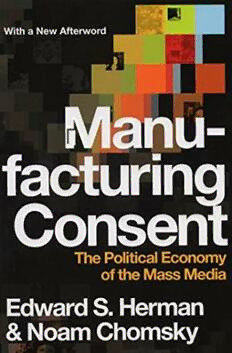Theories of Media and Communication
Blog post 3: ‘Manufacturing Consent’
‘Manufacturing Consent’ is an idea about how mass communication media of the U.S are “effective and powerful ideological institutions that carry out a system-supportive propaganda function, by reliance on market forces, internalized assumptions, and self-censorship, and without overt coercion”, by means of the propaganda model of communication. This theory was the focus of a book titled ‘Manufacturing Consent: The Political Economy of Mass Media’ published in 1988 and written by Edward S. Herman and Noam Chomsky. The title of this book is said to have referred to the consent of the governed who are the people who have agreed that the legitimate and moral right use of state power is justified only when there is consent from the people that political power is intended to govern. Although the book is a study of the propaganda model of communication conducted by the authors, it was based on the earlier work of an Australian social psychologist Alex Carey who was instrumental in the study of corporate propaganda. However, the title of the book also relates to the term ‘manufacture of consent’ which was first used in the 1922 book Public Opinion written by Lippmann.
Herman and Chomsky have introduced the propaganda model of communication to the world which basically describes five filters of editorial bias by mass communication media. They are: 1). Size, ownership and profit orientation. 2). The advertising licence to do business. 3). Sourcing mass media news. 4). ‘Flak’ and the enforces. 5). Anti-communism. These filters were said to have been used by powerful and influential US media institutions to support the system of producing effective propaganda for the consumption of the general public. For example, media networks are typically dominant in the industry depending on their size, and operate for profit. Because media networks receive revenue from advertising, they typically cater to the economic and political desires of the class of people whom they are serving which is usually middle class members of society rather than members of the working class. The media networks are also biased when it comes to reporting on government policy and business practices to earn the favour of the government in order for them to stay in business and not lose viewership and revenue from advertising which can be affected if they become “cancelled”. There is usually also a huge rise in legal challenges, complaints, lawsuits and political legislative changes that affect the reporting of news stories by corporate mass media. The ‘anti-communism’ filter is basically a tool used to crack down on ideas or beliefs that may threaten popular and common interests in order to avoid dissent amongst society.
The propaganda model of communication explained by Herman and Chomsky claims that the power of mass media networks consists of several stakeholders who all wield power to a certain degree in a type of hierarchy. Supposedly, organisations like broadcast and print media are at the bottom of the pyramid whereas the second layer consists of business firms with adequate resources to influence the sourcing of information deemed as being “news-worthy’. The final and most powerful party in this pyramid system would be the ruling government of major global nations whom have the most financial wealth and organisational power.
References:
- Wikipedia Contributors (2019). Manufacturing Consent. [online] Wikipedia. Available at: https://en.wikipedia.org/wiki/Manufacturing_Consent.
- Herman, E.S. and Chomsky, N. (1988). Manufacturing Consent: the Political Economy of the Mass Media. [online] New York: Pantheon Books. Available at: https://edisciplinas.usp.br/pluginfile.php/5537300/mod_resource/content/1/Noam%20Chomsky_%20Edward%20S.%20Herman%20-%20Manufacturing%20Consent_%20The%20Political%20Economy%20of%20the%20Mass%20Media-Bodley%20Head%20%282008%29.pdf.
- Chomsky, N. and Herman, E. (1988). A Propaganda Model, by Noam Chomsky (Excerpted from Manufacturing Consent). [online] Chomsky.info. Available at: https://chomsky.info/consent01/.
By: Abdikarim Hussein Abdi

